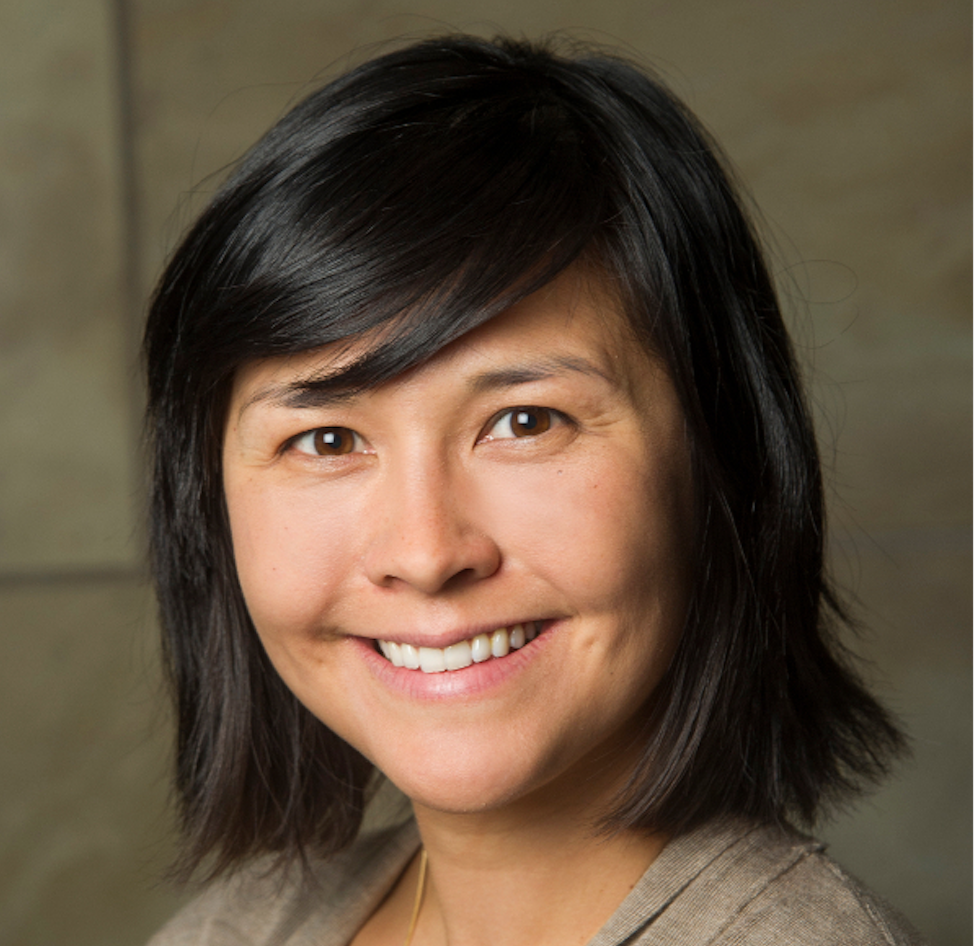
by biomed | Oct 26, 2018 | News
Congratulations are in order for NIH OxCam alumna Megan Dennis! She was selected for the NIH Director’s Innovator Award. “This program supports exceptionally innovative researchers who have the potential to transform the biomedical field,” said NIH Director Francis S. Collins, M.D., Ph.D. “[He is] confident this new cohort will revolutionize our approaches to biomedical research through their groundbreaking work.” Chosen as one of 89 grants awarded to extraordinarily creative scientists, Dr. Megan Dennis has been awarded $1.5M for her project Function of Duplicated Genes in Human Brain Evolution and Disease.
Dr. Megan Dennis joined the faculty at the UC Davis MIND Institute and the Genome Center as an assistant professor of medicine, exploring the underlying causes of neurological disorders. She received a bachelor’s degree in Biochemical Engineering from Michigan State University and a joint Ph.D./D.Phil. in Human Genetics from NIH/NHGRI and the University of Oxford, where she worked with Dr. Eric Green and Dr. Anthony Monaco on the genetics of dyslexia. Dr. Dennis continued as a post doc with Dr. Evan Eichler at the University of Washington, where she characterized complex genomic structural variation and its role in human evolution and neurological disorders.
Through her experience in the NIH Oxford-Cambridge Scholars Program, Megan has attributed much of her independence, innovation, and communication skills through having to manage a thesis project between the US and the UK. “The diverse training environment of the graduate program enabled me to succeed as a post doc and, ultimately, land an assistant professor position,” said Megan. These experiences have propelled her to dive into research areas outside of her expertise, reach out to collaborators and experts to pursue diverse research endeavors, and embrace new technologies.
In addition to winning numerous prizes including the NIH Ruth L. Kirschstein National Research Service Award through NICHD, the NIH Pathway to Independence Award from NINDS, and a Sloan Research Fellowship in Neuroscience, Dr. Dennis is dedicated to the advancement of diversity in higher education. Her lab actively works with students in the greater Sacramento community to teach genetics and neuroscience through workshops at local high schools. Additionally, in her three years as an assistant professor, she has mentored as many of nineteen trainees from diverse backgrounds, the majority of which were women and/or individuals from historically underrepresented backgrounds. “As a first-generation college grad, I hope to give trainees the same opportunities that helped me successfully navigate my way through a research career,” stated Megan. Striving for inclusion and diversity, Dr. Dennis is surely a scientist to watch. We see a bright future for Megan and are thankful she is recognized for such achievements.
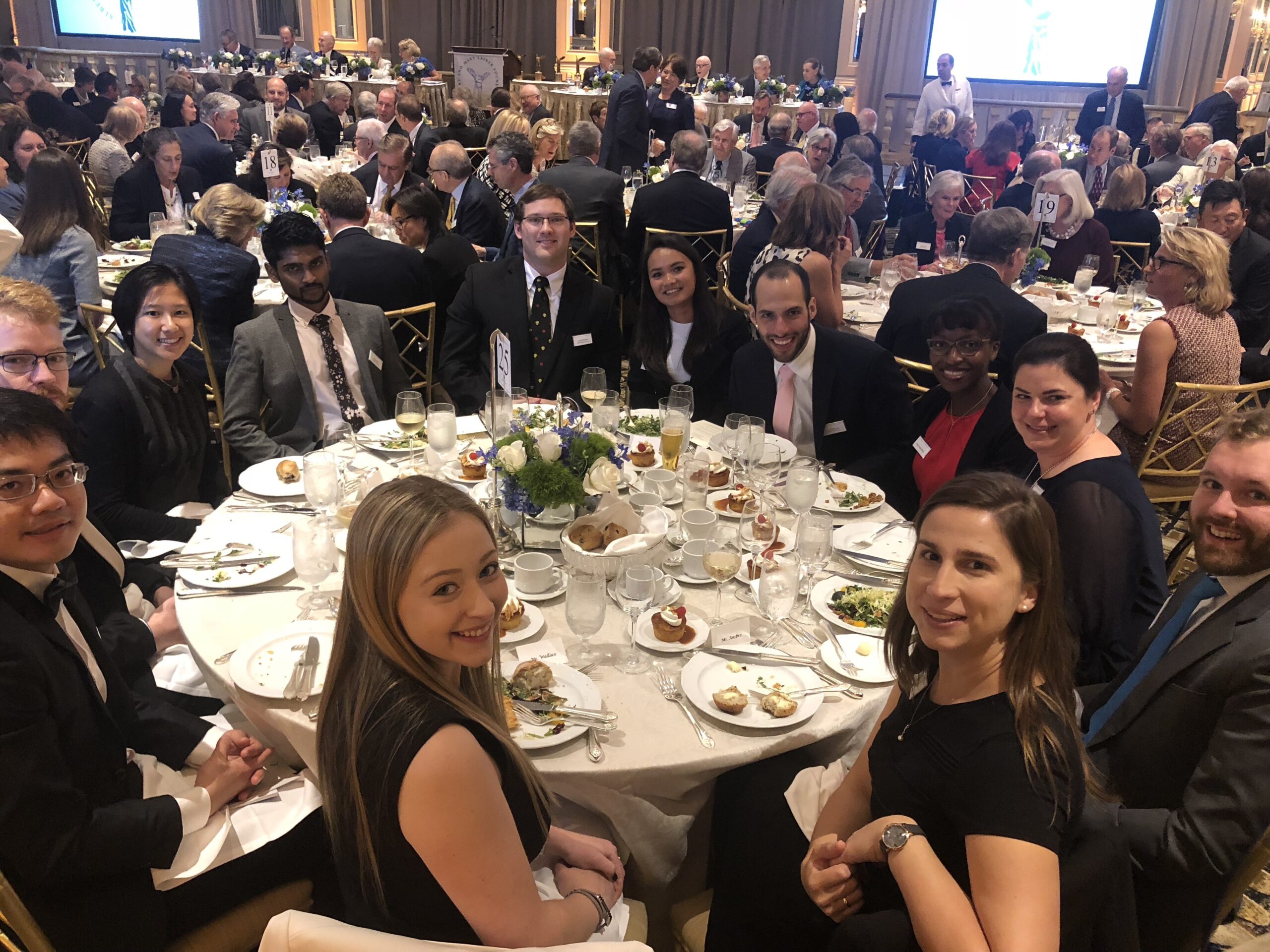
by biomed | Oct 22, 2018 | News
The International Biomedical Research Alliance, in collaboration with the Lasker Foundation, invited six students from the NIH Oxford-Cambridge/WT Scholars Program to attend the 2018 Lasker Awards in New York City. The scholars attending included Megan Ansbro, Brian Caffrey, Justin Demmerle, Joseph McAbee, Juan Pablo Ruiz and Lynda Truong, who were selected by the NIH OxCam Program and are all in the final stage of gaining their PhDs. NIH OxCam alumna Adoja Smalls-Mantey was our special guest at the awards. Dr. Smalls-Mantey graduated in 2013 and is currently a 4th year psychiatry chief resident at Mount Sinai Hospital Adult Psychiatry Residency Program in NYC.
On the morning of the Awards, the scholars were invited to attend Breakfast at Lasker – an intimate gathering of the 2018 Lasker Laureates, the NIH Oxford-Cambridge Scholars, the Lasker Clinical Research Scholars, and winners of the 2018 Lasker Essay Contest. Moderated by Jordan Gutterman, M.D., the breakfast was a roundtable discussion where the young scientists freely posed questions about everything from career paths and changes to diversity and inclusion, as well as inquiries geared to individual discoveries and advancements in science and medicine. Lasker Award winner David Allis of Rockefeller University discussed the importance of choosing the right lab environment. He spoke about how he mentors and supports the people in his lab and how each of the laureates at the table hold that standard. The importance of quality mentorship and serendipity was emphasized by Lasker Award winner Joan Steitz who spoke about her early years working with an outstanding mentor and previous Lasker Laurette Dr. Joseph Gall. His influence was pivotal in her realization that a career in science was obtainable at a time when female role models in science did not exist for her generation. “I don’t know if you pick the serendipitous moment or if it picks you,” said Lasker Laureate Michael Grunstein of UCLA. His work in graduate school provided the training for the next steps in his career, allowing him to succeed as a post doctoral fellow and further when he became a faculty member. After we discussed the laureates’ serendipitous moments, we also discussed career paths. Laureate Iain Glenn had a unique path, starting his career in veterinary medicine and following his discovery of propofol to industry. He looked up to Lasker Laureate James Black, who followed a similar path as both held careers at Imperial Chemistry Industries. It was so inspirational to hear about past Lasker laureates influencing the next generation of Lasker laureates.
However, the extraordinary experiences did not end there. Following breakfast, the scholars took photographs with the 2018 winners and began to meet with the current and past Lasker laureates, as well as a multitude of decorated scientists and notable guests arriving to attend the awards ceremony. “Today’s about the men and women who make a difference and we honor the discoveries concerning histone modifications and gene expression, the development of the widely-used anesthetic propofol, and leadership in RNA biology and in scientific mentorship,” said Lasker Foundation President Claire Pomeroy in her welcome.[/vc_column_text][vc_single_image image=”9926″ img_size=”large” alignment=”center”][vc_column_text]“Simple experimental systems, yeast and Tetrahymena have a rich history in biology, yielding countless fundamental insights that justify the public support of curiosity-driven research- providing insight on human health and disease,” Rick Lifton shared in introducing Grunstein and Allis’ discoveries. The 2018 Albert Lasker Basic Medical Research Award honored the two scientists for discoveries that have elucidated how gene expression is influenced by chemical modification of histones, the proteins that package DNA within chromosomes. Michael Grunstein said, “I’ve struggled with the question of how to advise young scientists, since there is no one path to scientific discovery and it is often the discovery of the path itself that makes us so excited to pursue science.” This statement inspired the audience and impacted the scholars.
The 2018 Lasker~Koshland Award for Special Achievement in Medical Science honored Joan Steitz who has spent four decades of leadership in biomedical science—exemplified by pioneering discoveries in RNA biology, generous mentorship of budding scientists, and vigorous and passionate support of women in science. “A final surprise has been finding that it is almost as fun to share the joy of discovery with a younger colleague as doing it oneself. I have been immensely privileged to work with very talented younger scientists and I owe this great honor to them!” said Dr. Steitz.
“The ubiquitous use of propofol and its benefits to hundreds of millions of patients are due to Lasker laureate Iain Glenn’s persistence in bringing propofol to fruition over many years, despite skepticism at each step,” said Lucy Shapiro. The 2018 Lasker~DeBakey Clinical Medical Research Award honored John B. (Iain) Glen (retired from AstraZeneca), who discovered and developed propofol, a chemical whose rapid action and freedom from residual effects have made it the most widely used agent for induction of anesthesia in patients throughout the world. In 2016, the World Health Organization deemed propofol an “essential medicine” and, at the time of that decision, more than 190 million people had received the drug.[/vc_column_text][cesis_gallery type=”isotope_masonry” images=”9928,9927″ img_size=”large” col=”2″][vc_column_text]For full descriptive information on the 2018 Lasker Award winners, video viewing of award overviews, and expectance speeches, please visit: The Lasker Foundation.
We gratefully thank the Albert and Mary Lasker Foundation for the opportunity to allow the scholars to attend the prestigious Lasker Awards. The future of biomedical research depends upon these serendipitous moments that could not be achieved without exceptional collaborators with an eye on the next generation of scientists.

by biomed | Oct 19, 2018 | News
What brought the NIH OxCam/Wellcome Trust Scholars to New York City this September? With a coveted invite to the Lasker Awards on Friday, September 21st, the Alliance hosted six students for the week leading up to their awards attendance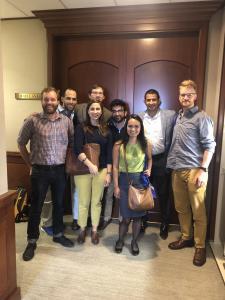 on Friday. This experience started off with educational and social events, focusing on developing and educating them on their career paths. This initiative was created to expose scholars to a variety a career options as well as providing the opportunity to conduct formal presentations on their research. The scholars attending these special events included Megan Ansbro, Brian Caffrey, Justin Demmerle, Joseph McAbee, Juan Pablo Ruiz and Lynda Truong who are all in the final stage of gaining their PhDs, with some returning to medical school shortly to finish their MD. The Alliance organized field trips that focused on academia, industry, investing, and medicine.
on Friday. This experience started off with educational and social events, focusing on developing and educating them on their career paths. This initiative was created to expose scholars to a variety a career options as well as providing the opportunity to conduct formal presentations on their research. The scholars attending these special events included Megan Ansbro, Brian Caffrey, Justin Demmerle, Joseph McAbee, Juan Pablo Ruiz and Lynda Truong who are all in the final stage of gaining their PhDs, with some returning to medical school shortly to finish their MD. The Alliance organized field trips that focused on academia, industry, investing, and medicine.
We kickstarted the trip on Wednesday, September 19th with a visit to PointState Capital to meet Dr. Kenan Turnacioglu. Dr. Turnacioglu is responsible for portfolio management of healthcare investments at PointState. Dr. Turnacioglu graduated from Rutgers University with a B.A. in History and Biology, and obtained a PhD from University of Pennsylvania in Cell and Molecular Biology. Thereafter, Dr. Turnacioglu conducted postdoctoral work in pancreatic cancer at Johns Hopkins Medical Center.
During his PhD, Turnacioglu learned important skills which accelerated his career in healthcare investing. These skills included critical thinking and problem solving, as well as collecting and analyzing data. Because there are not many people in investing that hold PhD’s, Dr. Turnacioglu described how it was useful and unique, especially in his own career path. Dr. Turnacioglu provided the scholars with a look at the day-to-day activities of PointState. He also discussed how an internship during the PhD would be extremely valuable and would provide the tools and experience necessary to determine if a career in investing would be right for the scholars. [/vc_column_text][/vc_column][/vc_row][vc_row][vc_column][vc_column_text]Our next visit was to see Dr. Martin Blaser, who warmly welcomed the scholars to his historic home at the Washington Mews. He spent time getting to know everyone by learning about their background and interests, as well as their research projects. Dr. Blaser is a physician and microbiologist who has published extensively on how changes in the human microbiome impact the development of several of the illnesses that have increased in recent years, including esophageal diseases, obesity, diabetes, and asthma. His work over thirty years focused on particular organisms, including Campylobacter species and Helicobacter pylori, which also are model systems for understanding the interactions of residential bacteria with their human hosts. He was elected to the National Academy of Medicine and the American Academy for Arts and Sciences. He holds twenty-five U.S. patents relating to his research and has authored over 530 original articles.
Dr. Blaser’s career path excited the scholars and they were fascinated by the journey and decisions he made which led him to where he is today. The majority of time the scholars spent with Dr. Blaser focused on antibiotic resistance, discussing which socioeconomic groups where most are affected and why, along with how he is trying to combat this soon-to-be epidemic. The scholars learned about the importance of microbial diversity and how society is slowly losing the microbiome because of antibiotics. The scholars also loved discussing Dr. Blaser’s book Missing Microbes. They were able to get their book copies signed and could not be more excited to read it when they returned home. Following our educational events, the scholars then attended dinner at Gallow Green and saw Sleep No More, an interactive play based on Macbeth at the McKittrick Hotel.After a walk through Washington Square Park, the group found themselves at the New York Genome Center (NYGC). Alliance Director Emeritus Dr. Harold Varmus (also a Lasker and Nobel Laureate) invited the scholars to tour the NYGC. Dr. Nicolas Robine, a member of the faculty who works on their cancer initiative, showed the scholars the laboratories and brought them to see the high-tech sequencers to learn about how they sequence high throughput human data. They learned about how the NYGC was founded and how it functions as a collaboration between major institutions in New York City and Long Island. Bright and early the next morning, the scholars visited Regeneron Pharmaceuticals to learn about biomedical research careers in industry. The day at Regeneron included an overview of the company, tour of the facilities, scientific presentations by their staff scientists and presentations made by the scholars about their research projects. NIH Gates-Cambridge Scholar Joseph McAbee said, “I really enjoyed the tour of Regeneron and hearing from some of the leaders from various departments and learning about what they are working on and so indirectly learning about career opportunities.”
NIH Gates-Cambridge Scholar Megan Ansbro said, “At Regeneron I thought it was very nice that they encouraged post-docs who matched some of our research interests to join us for the day. I also enjoyed learning about their post-doc program – which sounds unique and very cool! And finally, I liked learning about all of the genome projects they’re doing at the Regeneron Genetics Center.” NIH Wellcome Trust Scholar Brian Caffrey also commented on how much he enjoyed getting a feel for the work they did and how they “streamlined the velocimouse system,” which he found to be very cool! Later that evening, the Scholars were the guests of honor at a cocktail reception held in the home of Alliance board member Ann W. Jackson. Guests included individuals representing science, business, academia, private industry, philanthropy, and the Lasker Foundation and their 2018 essay contest winners, as well as New York City area alumni of the NIH OxCam program.
We gratefully thank Dr. Turnacioglu, Dr. Blaser, Dr. Varmus, Dr. Robine and staff at the New York Genome Center, Dr. Yancopoulos and his colleagues at Regeneron Pharmaceuticals, along with the supporters of the International Biomedical Research Alliance for their contributions to the experiences and events that provided an invaluable visit to New York for the Scholars.
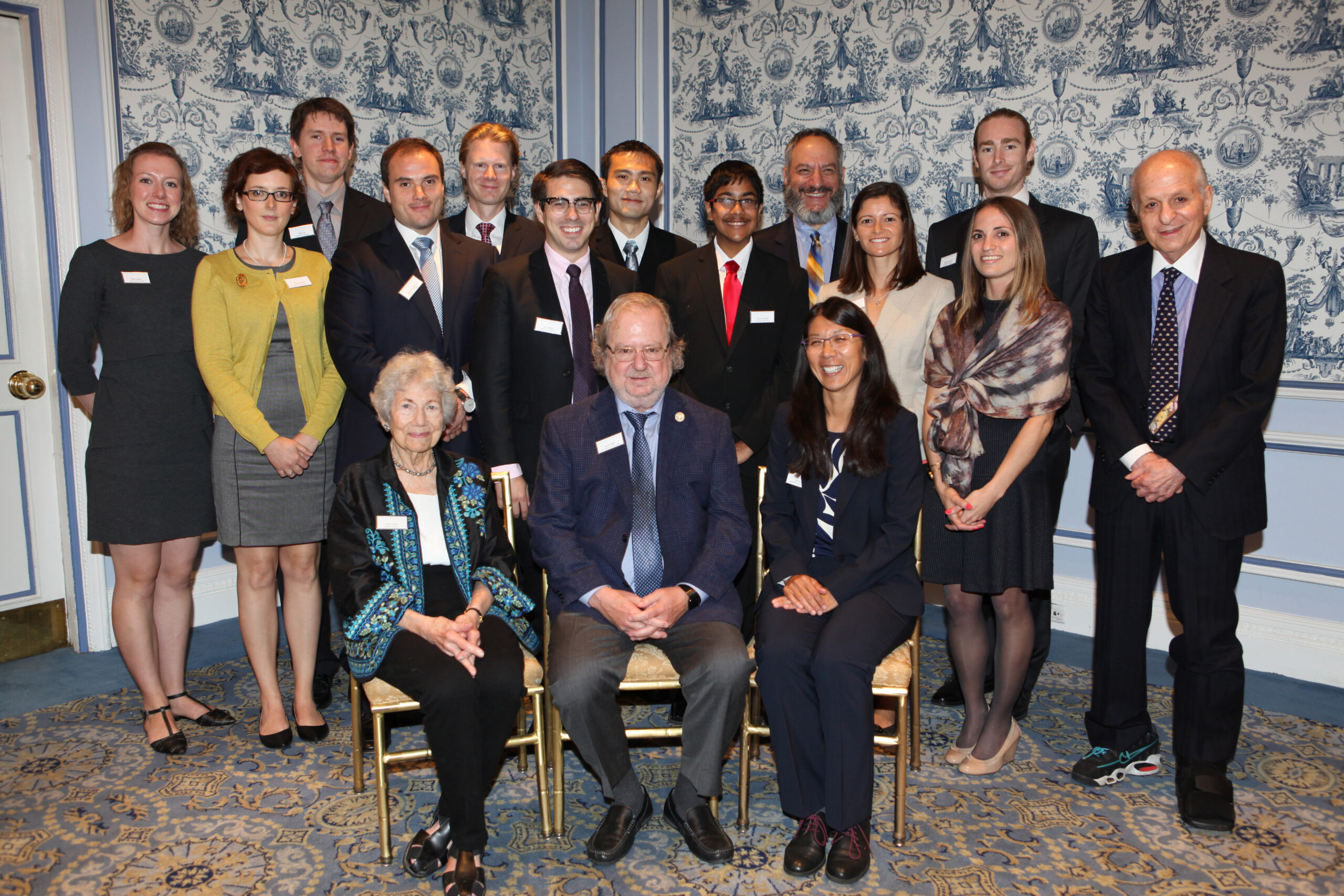
by biomed | Oct 18, 2018 | News
Have you heard of “America’s Nobels”? The Lasker Awards, often referred to as “America’s Nobels,” have been awarded annually since 1945 to living persons who have made major contributions to medical science or who have performed extraordinary public service on behalf of medicine. They are administered by the Albert and Mary Lasker Foundation, based in New York City and founded by Mary Woodard Lasker and her husband, Albert Lasker. As an activist and philanthropist, Mary Lasker played a major role in promoting and expanding the National Institutes of Health in Bethesda, Maryland – where our NIH Oxford-Cambridge Scholars train in the United States.
The Lasker Award is the nation’s most distinguished honor for basic and clinical research. As its nickname indicates, the Award is often a precursor to other distinguished prizes, such as the Nobel. The Lasker Awards gained a reputation for identifying future winners of the Nobel Prize and for a good reason. Eighty-seven Lasker laureates have received the Nobel Prize, including thirty-three in the last two decades. Well now that number is eighty-eight because Dr. James P. Allison, the 2015 Lasker~DeBakey Clinical Medical Research Award winner, was just awarded the 2018 Nobel Prize in Physiology or Medicine. What is even more fascinating is that the NIH Oxford-Cambridge/Wellcome Trust (WT) scholars have the opportunity to attend these prestigious awards and converse with laureates. In fact, a group of students did just that in 2015 and met Dr. James Allison, Dr. Evelyn M. Witkin, Dr. Stephen J. Elledge, and representatives from Médecins Sans Frontières (Doctors Without Borders). Present were NIH OxCam alumni Joshua Bernstock, Alice Easton, Ian Goldlust, Michael Gormally, Angela Ianni and Sarah Watters.
The Alliance congratulates Dr. James Allison and all winners of the 2018 Nobel Prize. We are watching and waiting for this pattern to continue and look forward to the day when we can witness one of our NIH OxCam scholars holding a Lasker Award in their own hands.
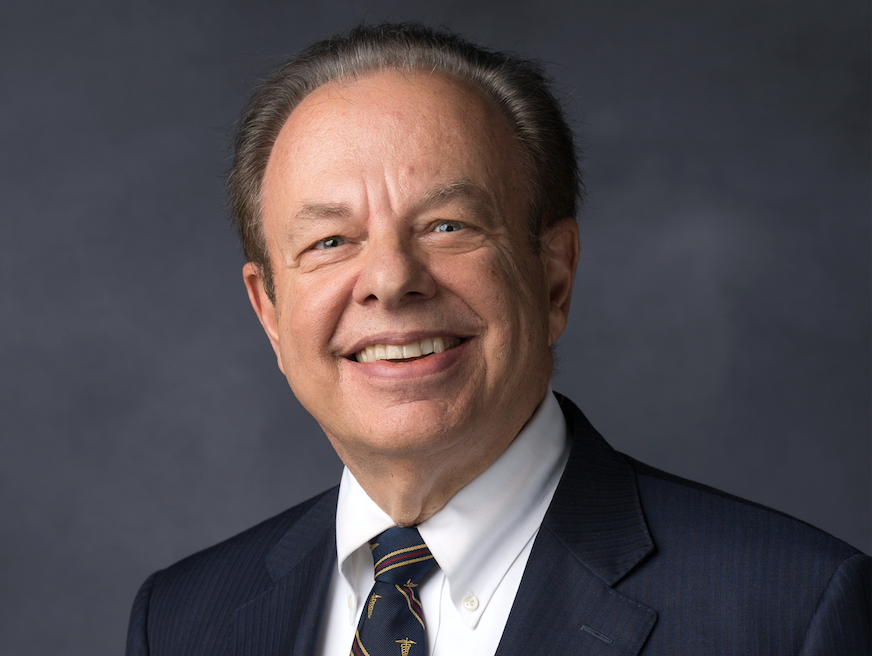
by biomed | Oct 11, 2018 | News
Dr. Korpman will provide mentorship to PhD and MD/PhD students in the US and UK
The International Biomedical Research Alliance, a non-profit organization which provides programming and funding support for the National Institutes of Health (NIH) Oxford-Cambridge Scholars Program, today announced that Ralph A. Korpman, MD, is joining the Alliance’s board of directors. Dr. Korpman is executive vice president and chief scientific officer at UnitedHealth Group and is a professor at the Loma Linda University School of Medicine.
“We are delighted that Dr. Korpman has agreed to join the Board of the International Biomedical Research Alliance,” said Stephen M. McLean, chairman of the Alliance Board of Directors. “I have been aware of Dr. Korpman’s revolutionary work in the field of patient care management technology for many years. His experience in academia and his entrepreneurial work provide a unique prospective from which the Scholars will no doubt benefit.”
“I am looking forward to mentoring these gifted early-career researchers who represent our next generation of scientific leaders,” said Dr. Korpman. “After having spent years focusing on the integration of new technologies into improving direct patient care, the time has come to now spend some of that time stimulating Scholar awareness and thinking on this axis, launching a new generation of research in this pivotal area and, ultimately, giving rise to better patient outcomes.”
Dr. Korpman is a recognized pioneer in the medical informatics field, beginning with his early work in introducing the concept of automating the clinical laboratory more than four decades ago. He has been instrumental in defining each new generation of health information systems over the years, being among the first to introduce the concepts of point-of-care systems, integrated clinical systems, and physician portals.
Dr. Korpman continues to advance his vision of the ubiquitous use of technology in health care by serving in a number of pivotal health care IT roles, including his current roles as executive vice president and chief scientific officer at UnitedHealth Group where he continues a lifelong focus on Individual Health Records.
Dr. Korpman served as founder, president and CEO of Health Data Sciences Corporation to pioneer Electronic Medical Records, and as chief scientist at Medaphis Corporation and Per-Se Technologies. Previously, Dr. Korpman founded Medical Data Corporation, a company that developed a variety of turnkey information systems for hospitals and U.S. government facilities throughout the country.
In addition to his corporate work in health care informatics, Dr. Korpman remains heavily involved in academia, including as a full professor at Loma Linda University School of Medicine.
Dr. Korpman received his bachelor’s and doctoral degrees from Loma Linda University, where he also completed residencies in anatomic pathology and laboratory medicine and a fellowship in clinical hematology. He conducted his graduate business studies at the Claremont Graduate School.
Dr. Korpman is the recipient of a number of awards, including the Young Presidents Organization Entrepreneur of the Year and Computers in Healthcare Health Care Pioneer. He is the author of more than 100 refereed articles and holds more than 50 patents. He has testified extensively over the years before Congress and before Federal agencies and was a founder of both the ANSI HISB and ISO TC 215. He is also committed to civic and community affairs, serving on several college and not-for-profit foundation boards.

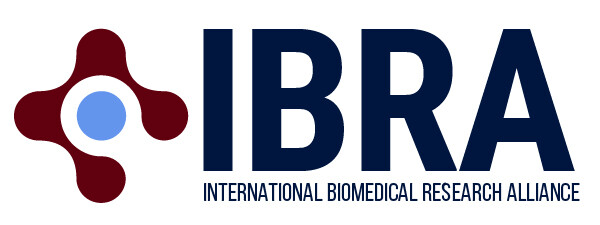


 on Friday. This experience started off with educational and social events, focusing on developing and educating them on their career paths. This initiative was created to expose scholars to a variety a career options as well as providing the opportunity to conduct formal presentations on their research. The scholars attending these special events included Megan Ansbro, Brian Caffrey, Justin Demmerle, Joseph McAbee, Juan Pablo Ruiz and Lynda Truong who are all in the final stage of gaining their PhDs, with some returning to medical school shortly to finish their MD. The Alliance organized field trips that focused on academia, industry, investing, and medicine.
on Friday. This experience started off with educational and social events, focusing on developing and educating them on their career paths. This initiative was created to expose scholars to a variety a career options as well as providing the opportunity to conduct formal presentations on their research. The scholars attending these special events included Megan Ansbro, Brian Caffrey, Justin Demmerle, Joseph McAbee, Juan Pablo Ruiz and Lynda Truong who are all in the final stage of gaining their PhDs, with some returning to medical school shortly to finish their MD. The Alliance organized field trips that focused on academia, industry, investing, and medicine.
